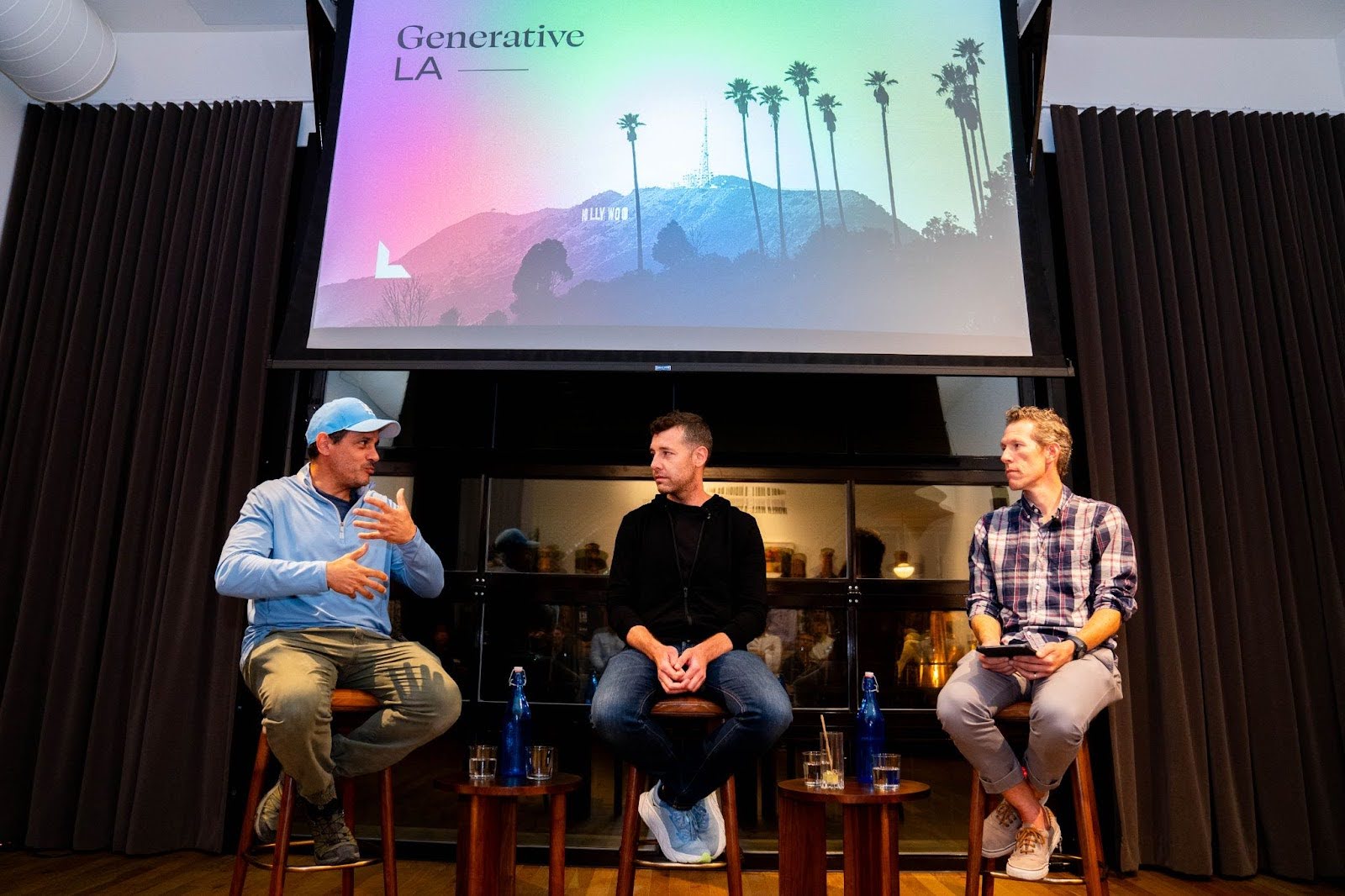11/26/2024
Fintech
AI
Talking Generative AI with Paypal and Brex
Key takeaways from #GenLA featuring Drew Tennenbaum, Vice President of Consumer Experiences at PayPal, and Cosmin Nicolaescu, former Chief Technology Officer of Brex.

This fall, Lightspeed hosted the latest in its Generative AI meetup series in Los Angeles, featuring a fireside chat with Drew Tennenbaum, Vice President of Consumer Experiences at PayPal, and Cosmin Nicolaescu, former Chief Technology Officer of Brex. The discussion was moderated by Justin Overdorff, Partner at Lightspeed, and centered around key areas where AI presents unique challenges and opportunities in fintech.
Below are highlights of the conversation, edited for clarity and brevity.
What is AI’s current place in Fintech?
During the past two years, there have been a lot of exciting discussions about AI disrupting industries overnight — discussions that were perhaps a bit exuberant and have caused some subdued conversations of an AI bubble. The panel, for its part, was still feeling bullish while admitting that AI isn’t quite there yet, especially in Fintech. They saw positive developments, however, in the abilities of LLMs to do math. Nicolaescu noted that models’ error rates are “much smaller” than previously. What still concerns him, though, is that the remaining errors are much harder to spot and don’t always align between different models.
But once these problems are fixed, incredible efficiencies will emerge. For instance, models will ostensibly be able to extract large amounts of data from contracts and then help finance teams analyze it to figure out better procurement procedures or how best to model revenue recognition. These tasks require such incredible computational power, however, that they fail drastically if there are any errors with their inputs. The models are almost there… but not quite.
Does AI in Fintech currently offer better opportunities for startups or incumbents?
It depends. According to Tennenbaum, PayPal’s consumer and merchant network sides are strengths that most startups will have a hard time competing against. However, “startups move so much faster than companies like PayPal do,” he said, caveating this with the observation that a company’s ability to move fast also depends on its leadership. Recent leadership changes at PayPal have created a new sense of urgency that helps give the company the ability to be a “first mover” like a startup.
Nicolaescu, for his part, thought that startups have an edge, “Because they can build something from scratch with the DNA of AI and try things they have never done before.” He admitted there were exceptions, though. “On the B2B side, I think large companies have the advantage because there’s so much more about the ecosystem, the workflows, and so the power of distribution is so much more powerful there.”
How has AI changed the hiring process and how you evaluate teams?
Even if AI hasn’t changed things much yet, it will. Tennenbaum observed that the number of job candidates using ChatGPT and other LLMs in the hiring process is becoming much greater. “So, I think the right thing to do is figure out how to adjust the hiring process to deal with that,” he said.
According to Nicolaescu, companies should start reevaluating skills that will increasingly be done by AI, such as certain engineering tasks that will probably be done automatically in the future. However, the devaluation of some skills will probably be offset by other skills becoming more valuable. “Eighty percent of my skills are pretty much going to zero,” he remembered hearing one engineer say, “But the other twenty percent are actually growing exponentially.”
What are the biggest opportunities in Fintech right now?
The panel was excited about opportunities with large amounts of unstructured text and AI’s potential to help humans make sense of it and perform time-consuming tasks much faster. For Tennenbaum, however, the richest opportunities aren’t necessarily in the Fintech space. They’re in HR-type tasks and optimizing workflows–areas where a lot of time is wasted. Nicolaescu agreed, urging people to examine business areas where companies are generally hesitant to invest such as procurement, IT, and HR. Instead of investing in a team, many companies will probably be willing to simply invest in a piece of software if it can perform the job well enough.
Nicolaescu had a warning, though. If your company does something well, “The market will come with more companies that just copy you, and they will move faster because they have the advantage of copying what you’ve done,” he said. “They don’t have to innovate as much, and so you constantly have to be ahead of them.”
Interested in attending a Generative event sign up here to receive notifications about future meetups, and be sure to listen to the Generative Now podcast, where AI builders talk about how they’re creating the future.



